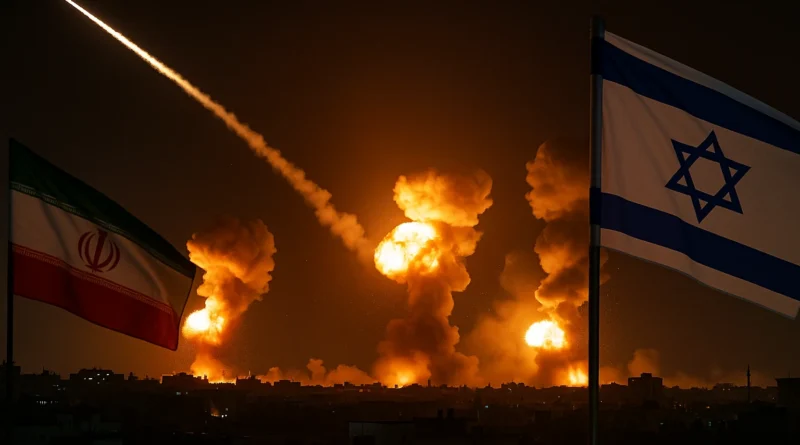Iran-Israel Conflict Escalates: Direct Strikes Hit Key Sites as Trump Weighs Intervention
The direct military confrontation between Iran and Israel entered its seventh day on Thursday, June 19, 2025, marked by relentless missile and drone exchanges that have struck critical civilian and military targets in both nations. The escalating hostilities have intensified international alarm, with world leaders closely watching as U.S. President Donald Trump publicly deliberates on the extent of American involvement.
Latest Escalation: Strikes on Hospitals and Nuclear Sites
The past 24 hours have seen a dangerous escalation. Israel launched fresh strikes on Iran, reportedly hitting the inactive Arak heavy water reactor, a key nuclear site, and facilities near Natanz. This came after Israeli authorities issued evacuation warnings in certain areas.
In retaliation, Iran unleashed a barrage of missiles towards Israel, with at least one projectile striking the Soroka Medical Center, a major hospital in Be’er Sheva, southern Israel. This attack caused “extensive damage” and injured at least 47 people, though no immediate fatalities were reported. Iranian state media, IRNA, claimed the intended target was an Israeli military command and intelligence base in the Gav-Yam technology park, not the hospital itself. Separately, Iranian missiles also reportedly struck the Tel Aviv Stock Exchange.
Over the past week, Human Rights Activists in Washington have reported that Israeli strikes across Iran have killed nearly 650 people and injured over 1,300, including civilians. In Israel, at least 24 people have been killed and hundreds injured by Iranian attacks since the conflict began last Friday.
Iran’s Stance: Defiance and Warnings to Third Parties
Iran’s Supreme Leader, Ayatollah Ali Khamenei, has vehemently rejected calls for surrender from the U.S., warning that any American military involvement would cause “irreparable damage to them.” Iran’s Supreme National Security Council issued a fresh warning on Thursday, stating that any “third party” intervening in the conflict would be “confronted immediately according to a specific plan.” This strong message is widely seen as directed towards the United States.
The Iranian Revolutionary Guard Corps (IRGC) has vowed to intensify attacks, announcing a “new round of combined missile-drone attacks against military targets and industrial centers related to the military industry in the cities of Haifa and Tel Aviv.” Iranian authorities also reported an internet blackout across the country, lasting over 24 hours, following the escalation. Additionally, Iranian police announced the arrest of 24 individuals accused of spying for Israel.
Israel’s Response: Unprecedented Threats and Military Action
Following the strike on Soroka Medical Center, Israeli Prime Minister Benjamin Netanyahu stated that Iran would “pay a heavy price.” Israeli Defense Minister Israel Katz has taken an unprecedented step, declaring that “eliminating” Ayatollah Ali Khamenei is one of Israel’s core war objectives, likening him to a “modern Hitler.” Katz emphasized that such a figure “cannot be allowed to exist.”
The Israeli military has confirmed continued strikes on Iranian targets, including what it described as missile launch and storage sites. They also reported intercepting multiple Iranian drones and missiles, with sirens sounding in various Israeli cities, including Haifa.
Trump’s Intervention: Mixed Signals and Military Posturing
U.S. President Donald Trump’s stance on direct intervention remains a critical, yet ambiguous, factor. He has publicly stated he is “weighing his options” and that “nobody knows what I’m going to do” regarding potential U.S. strikes on Iran. He reiterated his demand for Iran’s “unconditional surrender” and issued a stark warning against Iran targeting U.S. personnel or assets, threatening “gloves off” retaliation.
Trump’s early departure from the G7 summit in Canada earlier this week to focus on the escalating Middle East conflict underscored the severity of the situation. While publicly maintaining ambiguity, U.S. media reports indicate that President Trump has privately told his top aides he backs plans to strike Iran, including targeting sites like Fordo, a uranium enrichment facility. The U.S. has also repositioned military aircraft and warships in the region to protect Israel and respond to threats.
International Reactions: Calls for Restraint Amid Deep Concern
The international community is increasingly alarmed by the rapid escalation:
- Russia and China: Presidents Vladimir Putin and Xi Jinping held a call, criticizing Israel’s actions as violating international law and urging immediate de-escalation. Both leaders emphasized that there is “no military solution” to the crisis and offered mediation.
- European Nations: European diplomats, including foreign ministers from Germany, France, and the UK, are scheduled to meet with Iran’s foreign minister in Geneva on Friday to push for diplomatic solutions.
- WHO: Director-General Tedros Adhanom Ghebreyesus condemned the attacks on health facilities as “appalling,” urging all sides to protect hospitals and medical personnel.
- India: India has initiated evacuation efforts, with a first flight carrying 110 Indian students from Iran landing in Delhi today.
- Other Nations: Countries like North Korea have expressed support for Iran, while others like Turkey have increased border security and called for de-escalation. The Dutch embassy in Tel Aviv also sustained minor damage from Iranian strikes.
The volatile situation continues to develop rapidly, with global leaders on edge as they seek to prevent a broader regional conflict.

